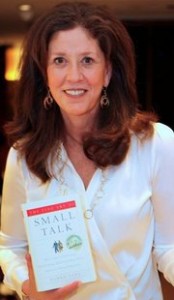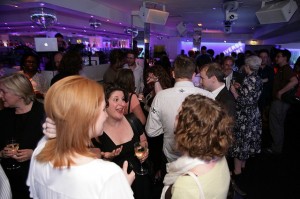Millions of times a day, Americans say THIS to each other:
“Hey, what’s up?”
“Nothin’ much. How YOU doin’?”
“Fine.”
These quick, casual greetings are as predictable as the sunrise. Imagine someone’s SHOCK if he asked “How ya doin’?” and you replied, “Well, not so good” and launched into a lengthy explanation as to why things aren’t really fine right now.
Every culture has polite rituals like this for those times when you pass someone on the street, or get stuck in line at the bank, or have to say SOMETHING to someone in an elevator, at a bus stop, or at a party.
Americans call it “small talk”:
“Hot out there, eh?”
“How ’bout those Yankees!”
“Does the Blue Line go to Falls Church?”
Empty pleasantries that pass the time. (We used to be able to ask, “Got a light,” but smoking is forbidden or frowned upon in all but a few wide-open spaces these days.)

Imagine this! Engineer Debra Fine turned talking, or writing about it, into a career. (Hyperion Press)
But Debra Fine says small talk can be SO much more. She’s a former engineer — and we know how chatty THEY are! — based in Denver, Colorado, whose success with a little self-help book has turned her into a motivational speaker. The book is The Fine Art of Small Talk. And it has what is probably the longest subtitle in bookselling history: “How to Start a Conversation, Keep it Going, Build Rapport, and Leave a Positive Impression.”
I think they call it “mingling” or “networking” these days.
Fine’s main point is that when we chit-chat half-heartedly, we miss a real chance to make friends and influence people. It’s the superior small-talkers, it seems, who get the good jobs, the smartest husbands and cutest wives, and invitations to all the hot parties.
Awkward pauses are killers, Fine says. Confidence is everything. The best conversationalists are those who do more listening than talking. One’s body language should match one’s words; that is, you’ll be spotted as a phony immediately if you ask a sincere question, then look at your watch or around the room while the other person answers.
Try as they might, some people just don’t get the idea that, by definition, a conversation involves two people. Three offenders, in particular, are sure conversation killers, Fine says:

Animated talking in social situations is a good thing, but only up to a point. (Jemima G, Flickr Creative Commons)
Monpolizers (and you know who you are), who get a good dialogue going and then overwhelm it with abridged versions of their entire life stories and their views on life, politics, the opposite sex, or the host and host’s spouse.
Know-it-Alls, who profess to have experience and wisdom on any subject that you bring up, up to and including brain surgery.
And Advisers, who have suggestions and solutions for every big and little problem in your life, whether you asked them for help or not.
You don’t want to be any of those people, Fine advises. “Mingle with moxie,” she writes, meaning that you’d be surprised at how eager strangers are to talk with you if you just approach them with confidence and genuine interest in what they have to say.

Now THESE guys (or gals) have small down down to a science. (Michael Berenz, Flickr Creative Commons)
So AFTER you’ve asked someone, “What do you do for a living?” and the person answers, “I lay carpet,” don’t be a mouse! Say something dynamic, like “That’s FASCINATING. What’s your typical day like?” And off goes the conversation and a new relationship!
No more hiding in the bathroom or hanging out at the buffet table. YOU can be the Alexander the Great of small talk!
“How you doin’?”
“Good. How YOU doin’?”
OK, so it’s a little more nuanced than that.
Sprechen Sie ‘Like’?
Speaking of language, if yours is something other than English — Swahili, perhaps, or Indonesian — help me out for a second.
Do people say the equivalent of “like” in your culture the way they do here?
Americans have always had little conversational crutches — meaningless words they toss into sentences to help them stall for just a moment while their minds catch up with whatever their mouths are in the middle of saying.
Little empty bridges, such as “you know” and “I mean,” give us just the instant needed to put the rest of a comment together:
“I’m, you know, pretty fed up with what’s going on here.” Or “He called me six times yesterday. I mean, he just wouldn’t stop.”
Such phrases add no information, no meat, no value, but they do no particular harm, either. I once had a professor who peppered his lectures with “don’t you know” as his place-holder. “Journalists need to protect their sources, don’t you know.”
Sometimes he’d throw in a “don’t you see,” as well. “You’ve got to maintain objectivity, don’t you know, don’t you see.”

I don't read ANY of these languages spoken in East Timor. Are there some empty sentence phrases in here? (João-Paulo-Esperança, Flickr Creative Commons)
Carol — my photographer wife if you haven’t been introduced for a time — has been gnashing her teeth over a phrase that a contractor with whom she has been working tosses out two or three times a minute, apparently without even knowing he’s doing it. It’s “at the end of the day” — a perfectly functional expression unless it’s applied to each and every conceivable situation:
“Yeah, but at the end of the day, we need the images.”
“You know, at the end of the day, we’re all playing the same game.”
It’s like having a shorthand philosopher tagging along, dishing out the same advice hour after hour.
Or should I say, “At the end of the day, it’s like having a philosopher tagging along.”
And speaking of “like.”
This little word has its proper place as a simile, used for making comparisons, of course. Bob Dylan’s “Like a complete unknown/Like a rolling stone” comes to mind.
But then, and I think it was back in the dreadful surfer and “valley girls” era of the 1980s when California “dudes” and “babes” splattered the silver screen and our language with “Valspeak.” “Duh” and “like totally,” for example, dispensed for no discernible reason.
Thankfully, “totally” has pretty much gone the way of miniskirts and legwarmers, but, like a kudzu vine — no, no, that is the correct usage — “like” took root and overwhelmed our discourse.

Even three of my four grown children — daughters of a reputed grammarian, I remind you — sprinkle their remarks with empty “likes” as sentence fillers.
“I mean, like, we’re not really sure.” Or “I said to Joe, like, ‘What’s going on here?’”
And “like” has also taken the place of “said” in youth-speak, as in: “So he asked me what I thought, and I was like, ‘It was great!’ And he was like, “Yeah, great.” I can deal with my daughters’ sloppy talk by arching an eyebrow. They know exactly what this means, and they begin listening to their own words and speak, like, properly for the next minute or two.
I threw that gratuitous “like” into the last sentence just to make the point of how annoying this word has become.
But what’s one to do when you’re trapped, cheek by jowl on the Metro subway, next to two young magpies, tossing “likes” at each other like — don’t worry, that “like’s” OK — kids in a water balloon fight.
“Like, he was SO rude.”
“Yeah, like, I know. He’s like, you know, like in space.”
“Yeah, like, out of control. I mean, like, not with it, you know.”
Get me out of here before my ears ignite.
I know, you’re saying, “Lighten up. Get with the times. Don’t be so, like, rigid and uptight.”
I can’t seem to do it. It would be . . . like . . . standing next to you while you dragged your fingernails across a blackboard, repeatedly and loudly. How could anyone ignore such a screech?
Maybe it’s just an American thing. An “ugly American thing,” if you ask me.
If you’ve learned to live with a “like”-type crisis in your native tongue, help me, please. How do you it?
Elevator Fais-do-do
Speaking of elevators, as I was in passing, many paragraphs ago, I love to watch Americans’ behavior in them.
Ample research bears out the stereotype that, with the exception of certain early-generation immigrants from what you might call “touchy-feely cultures” — those in which close contact and emotional conversation seem entirely natural and proper — we prefer to keep a bit of distance from each other. There’s no precise acceptable length of that distance, but we know it when we feel it.

A very unrealistic crowded elevator. Why? Because these folks are SMILING. (particlem, Flickr Creative Commons)
Merely brushing the wrist of the person seated next to you with your newspaper on the subway, for instance, is cause for astonished looks and muttered apologies.
If you want to see this phenomenon in microcosm, squeeze into a crowded elevator, say here in Washington. There’s little choice but to at least graze each other, all the while looking straight ahead or up at the floor indicator.
The fun comes as the elevator cab begins to empty out and a predictable dance takes place. I delight in watching it: Two people exit, and the remaining passengers shift to equidistant spots apart from each other.
The quintessential adjustment comes when there are three people aboard, separated like the points of a triangle, and one departs the cab. Inevitably, even though there’s plenty of space between the remaining pair, they will edge toward the opposite sides of the car.
When I’m in this situation, and I happen to be the person at the top of the triangle when another passenger leaves, I deliberately stay in place, just to observe my fellow passenger’s discomfort. With my gray hair and lumpy build, I certainly can’t be threatening.

If you don't like other people on your elevator, try one of these! (Marion Doss, Flickr Creative Commons)
But the other person will scrunch closer to the wall nonetheless, or glance furtively at me as if to ask, “What’s your problem, Bud? Why aren’t you shuffling over to the other side like you’re supposed to? What are you, some kind of nut?”
In such circumstances, I suppose, the last thing the other passenger wants to hear is one of Debra Fine’s snappy conversational “icebreakers,” so I keep standing, silently, looking up at the flashing floor signals.
But there’s a little smirk on my face, I’m sure.
Ted's Wild Words
These are a few words from this posting that you may not know. Each time, I'll tell you a little about them and also place them into a cumulative archive of "Ted's Wild Words" in the right-hand column of the home page. Just click on it there, and if there's another word that you'd like me to explain, just ask!
Fais-do-do. A dance party, specifically in French-speaking Louisiana, but the term can be used to describe any vigorous dance routine, with or without music.
Magpie. A noisy blackbird, made famous by the two gabby cartoon magpies, Heckle and Jeckle. An overly talkative person is sometimes called a magpie as well.
Valley girls. Materialistic, self-centered, hedonistic, and often sexually promiscuous young women from Los Angeles’s San Fernando Valley, at least as depicted in a series of forgettable “beach blanket” and surfer movies of the 1980s. These girls were more interested in fun and fashion than anything serious in their lives, and so they fit two more Wild Words coined a bit earlier: “ditzy” and “airhead.”



5 responses to “English as MY Second Language?”
Mr. Tad
I have just come across you brog and I want to say thank you.Here in Brazil we have the same problems regarding the empty words and the elevator.
The Sheraton Princess Kaiulani Hotel in Waikiki, Hawaii has hit on the perfect solution for the awkwardness in an elevator. They’ve installed a digital picture frame in the upper corner of the elevator, rotating photos of all the hotel’s amenities. Absolute genius! High school teachers would kill for that kind of avid attention.
Ooops! The ALA is mistakenly spelled Academy of Linguistic “Awarness”. [Or better yet, THIS admonishment sounds like me. (debaird™, Flickr Creative Commons)]
Very interesting blog, thank you.
Dear Hilda,
Good catch on the “Awarness” mistake in the organization’s name. I think it was a typo, since every reference that I’ve found for the group shows it spelled, like, correctly!
Ted
Yes, most likely a typo 🙂
Unfortunately there is something like “like” in Brazil. It’s the word “tipo”, most often used by teenagers ‘like’ thrice every 2 phrases and exactly the same way americans use “like”. My daughter corrects herself as soon as she says it in front of me – it’s equally annoying in Portuguese. It seems to be a direct translation of “like”, just as in the last 10 years people keep using the gerund in statements where the correct portuguese would never allow: I’ll be going to do it tomorrow/I’m going to be doing it tomorrow = Vou estar fazendo amanhã. This is even worse than ‘like’, gives one earaches.
Great topics, thanks for sharing.